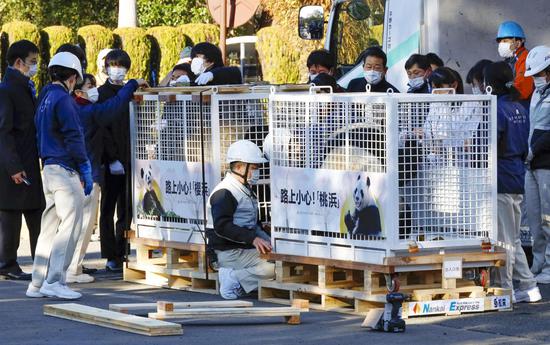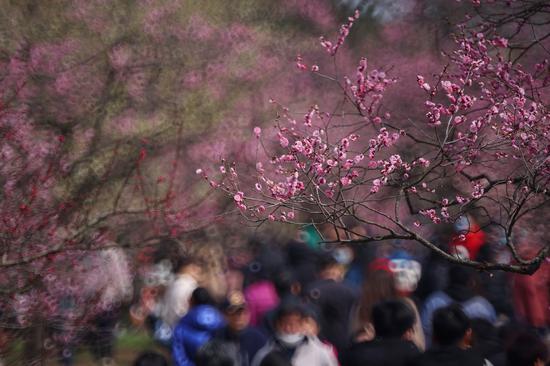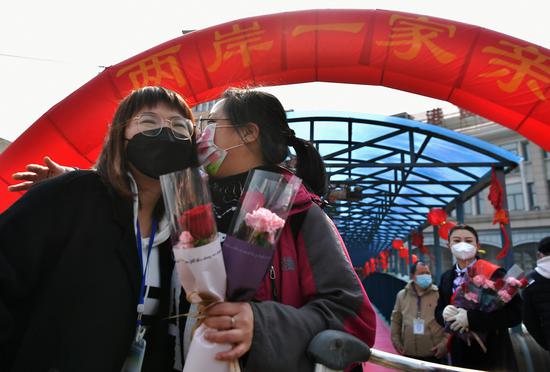
Patients receive treatment at the emergency department at Gansu Province Central Hospital in Lanzhou, Gansu province, on Jan 16, 2023. (Photo by Pei Qiang/For chinadaily.com.cn)
Additional pharmacies will be included so that benefits of overhaul can be felt
The recent reforms to the employee health insurance policy are aimed at easing the financial strain on outpatients and reducing unnecessary hospitalizations of patients with mild conditions, a National Healthcare Security Administration official said on Saturday.
The overhauls will expand coverage from just covering hospitalization costs to outpatient spending as well, including fees for examinations, laboratory tests and medications, the unnamed official said in a release posted on the administration's WeChat account.
The previous lopsided policy led to a surge of hospitalizations even for patients with mild conditions, the official said.
The proposed changes will help relieve the shortage of hospital beds, better allocate medical resources and save hospital space for those in real need.
The response comes in the wake of public scrutiny of the reforms following the introduction of reduced monthly insurance cover payments that have affected tens of millions of the insured, particularly retirees.
Established in 1988, China's employee health insurance is collectively paid for by workers and, more prominently, by employers.
The contributions of individuals, and a small part of those by employers, go into a personal account, which can be used to pay outpatient costs.
The lion's share of employers' contributions goes into a pool of funds operated by local health insurance authorities, which is used for refunding costlier hospitalization bills.
Under the revised rules, employers' contributions to workers' private accounts will be directed to the fund pool, resulting in lower premiums in personal accounts.
For example, insured retirees aged 70 or younger in Wuhan, Hubei province, used to receive around 260 yuan ($37) a month, but that amount was reduced to 83 yuan after the local government adopted new rules in January, according to the city's healthcare security administration.
Despite the reduction in payments, the official stressed that current balances will not be lost and can still be used to pay for medical costs.
"The core of the reforms was to adjust how personal accounts are funded in exchange for increased coverage of outpatient costs," he said.
In the past, due to weaker capability in diagnosing and treating diseases in outpatient departments, many patients with conditions deemed mild nowadays had to be hospitalized, so the reimbursement policy was set in favor of hospitalizations.
But the changes over the last two decades in society and the economy have seen the rise of more capable outpatient departments, which lead to less need for hospitalizations. Meanwhile, since outpatient treatments has increased, "the people's call for outpatient costs to be covered has become louder", the official said.
The increased capacity of outpatient departments is partly reflected by the rise in the number of outpatient visits nationwide, which rose to 8.04 billion in 2021, up 312 percent from 1.95 billion in 2001, according to the figures provided by the administration.
The reforms were also proposed with an eye on China's fast-aging demographics.
The number of people aged 60 and older, who have a greater need for medical services, stood at 280 million at end of last year, and is projected to reach some 400 million by 2035, adding greater urgency to overhauling the insurance system.
In 2021, outpatient visits by retirees were 2.17 times higher than those made by workers, and their medical spending was 1.15 times higher than that of workers.
The inadequate coverage of outpatient costs discourages older patients from seeking immediate medical attention, which often lands them in hospital beds when their conditions worsen, according to the official.
The administration said that 99 percent of healthcare providers have started reimbursing outpatient costs. In 2022, 108.6 billion yuan in outpatient spending was refunded. Around 441 million outpatient visits have already been reimbursed this year, totaling some 46.2 billion yuan.
The official said the benefits of the reforms haven't been felt evenly by people across the country because of regional differences.
With that in mind, the administration is planning to allow insurance to cover medication costs incurred at more pharmacies to help people avoid busy hospitals; expand the supply of drugs at grassroots health facilities previously only available at larger hospitals; and promote digital reimbursement to reduce the need to visit offices to fill in paperwork.


















































 京公網安備 11010202009201號
京公網安備 11010202009201號